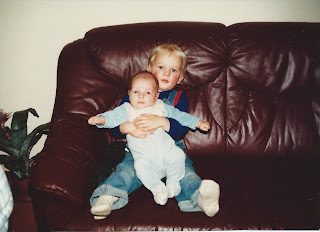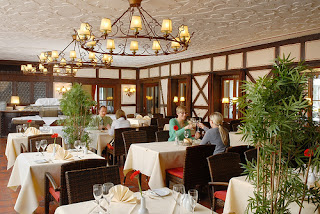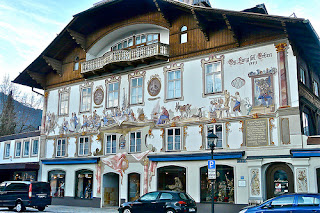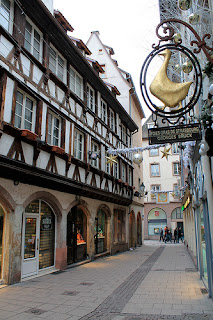 |
| Slightly older than 4-year-old neighbors from Dudrey Court |
Many times in my life I have said that I thought four years old was the perfect age - or at least it was
my perfect age. At four years old, I hadn't started school yet, so I didn't have any routine to my life besides wanting to get up earlier than my parents and not wanting to go to bed when they told me to. I didn't have any homework to do. I only had one sibling to have to share anything, including my parents' attention. And I found it very easy at that age to meet someone new and become best friends with him or her instantly.
I was four years old when Margaret Simonitsch's family moved back to the house across the street from ours. They had lived there before, but then I was too young to have any memories of them. I still remember clearly the image of seeing blonde Margaret on the driveway of the house across the street, looking towards our house. She wasn't the first person in the neighborhood about my age, but she was the closest one to our house. And I knew right away that she was going to be my friend.
We often took drives on Sunday afternoons when Dad wasn't working a shift that had him at the Power Plant all day. And when we took those drives, I don't think even Mom knew where we were going to end up. Sometimes it would be at one of Mom's or Dad's sibling's homes on the farm. But sometimes we would drive somewhere else, like to Detroit Lakes, where high school friends of Mom or Dad lived. I recently learned that Dad's sister Myrt and her family lived in Detroit Lakes for a year or so. Perhaps that was the reason Dad drove that far from town just to visit. And I remember meeting another four-year-old girl in the neighborhood on one of those trips. I don't remember her name. I don't remember if she was a relative or the daughter of a friend. Perhaps she was just the child of a neighbor. But I remember being very comfortable playing all afternoon with her. Or maybe it was just an hour. An hour today seems so much shorter than an hour seemed at four.
Maybe it is because I have such good feelings about being four years old that I was so comfortable being around four-year-olds in Germany. Or maybe it is that I am an introvert who is more comfortable talking with just one person at a time and four-year-olds are a good audience for conversation in a foreign language. I had three experiences in three different cities with four-year-olds. And each brought back the feeling of being four myself.
The first was when my colleague Judith and I went to Berlin on a Thanksgiving weekend tour organized by the Armed Forces Morale and Welfare organization at Patch Barracks. In addition to all the site-seeing that was built into the trip, I took the opportunity to visit a couple I knew there whom I had met at a South St. Paul Romanian restaurant several years before. Martin* had been a visiting professor at the University of Minnesota that semester and his girlfriend, Marina*, was from Romania. They met in Berlin when Marina and her ex-husband arrived there after having driven across the border into Hungary and then Austria and finally into Germany. Marina and her husband saw that they had the opportunity to get out of Romania and while they knew they no longer had the basis for a relationship, they decided to make this last trip out of Romania together, after which they split up and never saw one another again.
Martin had heard about the Romanian restaurant in South St. Paul so when Marina joined him in Minnesota for his last few weeks, he took her there. It turned out to be an evening when the Romanian dance ensemble I was part of performed at the restaurant. After we concluded our performance, we always grabbed a few patrons at the restaurant to get them dancing with us. Marina and Martin joined us gladly, and that was the beginning of our acquaintanceship.
A few days after we met them at the restaurant, they called my ex-husband and me to ask if we would join them for dinner. They had a purpose for the invitation. They were hoping we could help Marina find a place where she could get a quick divorce. The German government wouldn't allow them to marry until she could produce a divorce decree. And she couldn't get divorced in Germany without her husband's involvement in the process, but she had no idea where he was. She knew that if she could get a divorce somewhere in the world, and then she and Martin could marry there, the German government would acknowledge their marriage.
 |
| Zephyrius and Amalyswintha |
We weren't able to help them with that problem, but I stayed in touch with them, exchanging Christmas cards each year, even after John and I had gone through our own divorce. By the time I was assigned to Germany, I knew they had traveled to Denmark where Marina got her divorce and they were able to marry. They now had two children whose names I will never forget: Zephyrius and Amalyswintha. When I learned I was going to Germany, I got in touch with them and Judith and I made our way to see them during our Thanksgiving holiday.
Amalyswintha was still an infant, but Zephyrius was about four. While both Martin and Marina spoke very good English, Zephyrius only spoke German. Since my German was not much better than a fourth graders', I was able to converse quite well with Zephyrius. I was very interested to see how much his language skills had developed, so I asked him a lot of the W-questions -
who,
what,
when,
where, and
why. I knew that children develop the concepts of
who and
what before they learn
when and
where and that
why is a more complex concept. During our conversation, I observed that Zephyrius had
wer (who),
was (what),
wenn (when) and
wo (where) down pat. But when I asked him questions that began with
warum, the German equivalent of
why, he usually just repeated what he had last told me.
When Marina told Zephyrius it was time for him to go to bed, he looked up with a sad look on his face and said, "
Aber wir spielen" (but, we are playing). I was reminded of my four-year-old self in that moment.
The next four-year-old was the son of a couple Judith knew who lived in Wiesbaden. John* was American and his wife Ulrike* was German. They were following all the advice at the time about one parent speaking consistently in one language and the other consistently in the other language in order to help their son, Jacob*, master both languages. So John spoke with Jacob in English and Ulrike spoke with him in German. In this case, I started asking Jacob the same set of questions I had asked Zephyrius, but in English. And I noticed the same thing. Jacob could answer the
who,
what,
when, and
where questions, but
why questions stumped him. I decided both Zephyrius and Jacob must have barely turned four because between 3 and 5 years old is when most children begin to ask their parents all those
why questions, so famously followed up with yet another
why? Or maybe it is that they learn how to ask the question without necessarily having mastered the concept so they ask again, trying to figure it out. After all, once the first
why question has been answered, the answer to the next one usually changes. How easy is that for a child to understand?
After we had a meal, the five of us - John, Ulrike, Judith, Jacob, and I - were standing in the kitchen talking and Jacob was trying to get his parents' attention when Ulrike suggested to him in German that he should go and play. He responded "OK," with a smile and then came to me and took my hand to bring me with him to play. That just about melted my heart.
My final four-year-old experience was when
Pradeep and Parvani invited me to join them and several of their German friends at a celebration of the Indian holiday of Diwali, the festival of lights. In India, Diwali is a family holiday, but Pradeep and Parvani not only were far from their families, their families were still not happy with their marriage, so it is likely they would not have been welcome in the home of either of their parents anyway. So they invited all the people who had become important to them, and their children, to celebrate Diwali with them.
There were lots of children. I had spent several evenings with Pradeep and Parvani, but never with so many other adults. I think that is why I gravitated toward the children. In this event, there wasn't just a single four-year-old child for me to talk with; there were many children of a variety of ages. So I sat down on the floor with them and asked them questions - not the series of W-questions this time, but questions to get them talking about what was important to them. Some of them seemed bored to be at this event they didn't understand. I think some of the older children thought they might shock me with their answers - I'm certain some of their parents might have been shocked, if the children were honest enough to tell their parents the same thing. But I slipped right into being my 4-year-old or 8-year-old or 12-year-old self, albeit a much more confident version of those younger inner children, and kept the conversation going throughout the evening. If they mentioned something I didn't know anything about, I asked them to tell me more. If they mentioned something I knew something about, I told them what I thought, careful never to mix in any judgment in either my words or my intonation.
I don't want to be four years old again, or even 44 years old. But I hope I'll never stop being able to remember what it was like to be four.
*a name, not necessarily the right one

 by e r j k p r u n c z y k
by e r j k p r u n c z y k 





















